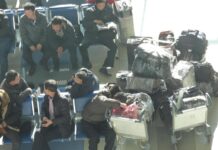[imText1]The United States is expected to tighten its North Korean policy by strengthening financial sanction and containment through the UN resolution 1695, within the boundary of six-party talks.
Such expectation is materialized as the U.S. Assistant Secretary of State Christopher Hill visits Northeast Asia, recently. Hill, during a press conference in Seoul, said that North Korea did not pursue fulfillment of the 9.19 communiqué, and added “every member state of the UN must follow the Security Council’s resolution and we will watch it.”
Hill is known as the leading advocate of negotiation with North Korea in the U.S. In his recent trip to East Asia, Hill might have met with Kim Kye Gwan, Vice Minister of NK Foreign Ministry. But Pyongyang did not respond to Hill’s call and the U.S. seemed to conclude that NK lacked will to follow the 9.19 communiqué, in which NK promised to give its nuclear program. The six-party talks have become a lame excuse of Pyongyang’s procrastination.
The U.S. Secretary of Treasury Henry Paulson’s plan to meet South Korea President Roh Moo Hyun, during Roh’s official visit to the U.S. this week, is also worthy of notice. Paulson is responsible to financial sanction against North Korea. The meeting’s main topic will not be anything but financial sanction.
However, it is not known yet whether Washington would ask for South Korea’s more vigorous participation in sanction, or Seoul will request appeasement policy to attract NK to return to the six-party talks. Nonetheless, since the gap between the two countries’ perspective, the summit will not have a more than symbolic meaning.
Therefore, it has become evermore probable that the U.S. would announce a wholesale sanction against NK after Hill’s East Asian tour and the U.S.-South Korean summit on Thursday. Given the perspective, the U.S. might hope to create another multi-lateral international structure to deal with security concerns of East Asia.
It might be problematic to press North Korea without participation of Seoul and Beijing. Moreover, U.S. is currently dealing with Iran’s nuclear program, too. So a joint solution that is applicable to nuclear development of both Iran and North Korea could be suggested.
Tom Casey, deputy spokesperson of the Department of State, announced on Tuesday that every necessary means will be exercised to terminate North Korea’s nuclear weapon or other WMD development program.
Professor Kim Tae Ho, a South Korean expert on NK, anticipated deepening rather than broadening of existing sanction policies against the North.
According to Professor Kim, it is possible to conduct intensive financial sanction world wide or inspection of North Korean ships on the sea through PSI, Proliferation Security Initiative. “South Korean government’s aid to North Korea,” Kim added, “would be in trouble as sanctions get intensified.”
An anonymous international politics professior commented that “there is no need for special measure to put pressure on North Korea right now, but if NK does not give up the nuclear program, coercion will get hardened.”
The professor supposed that Bush administration would not yield to North Korea’s persistence, since both countries’ fundamental interests are at stake.




















